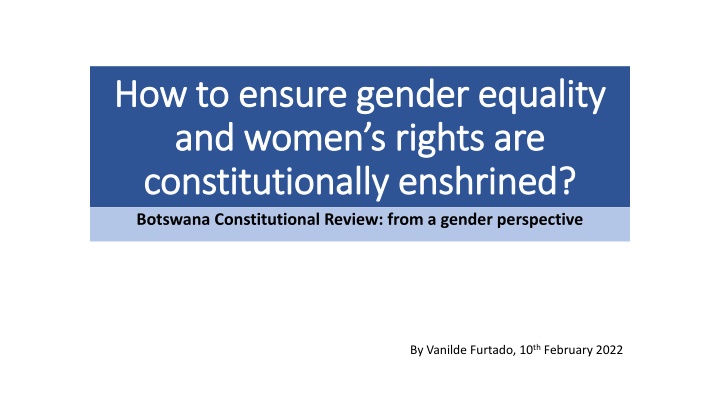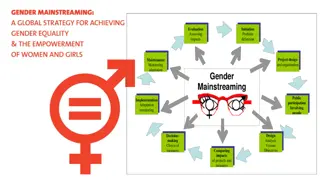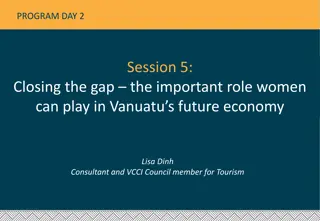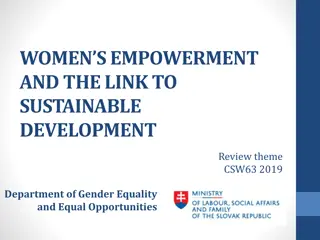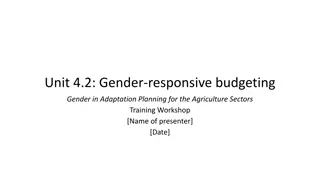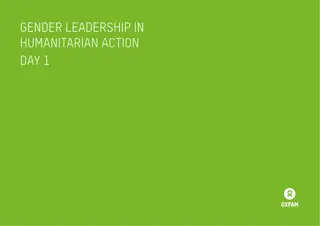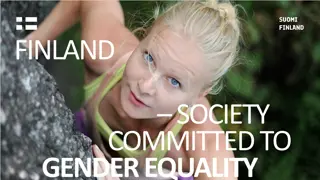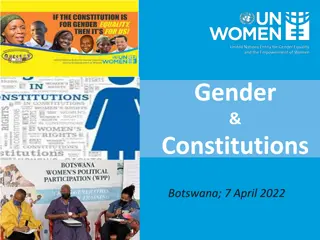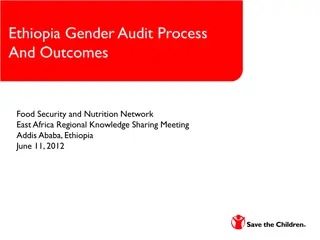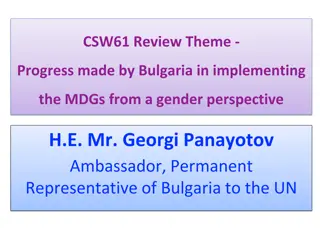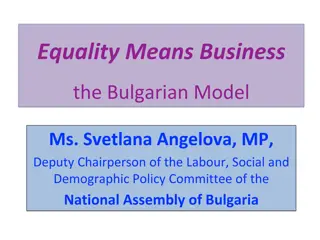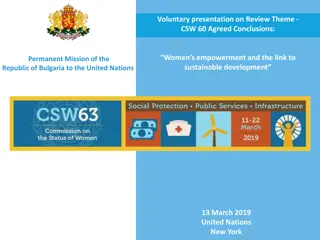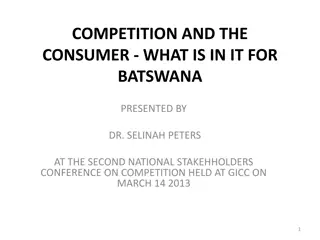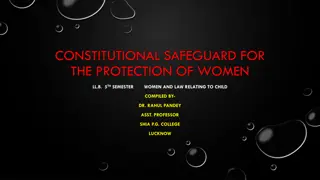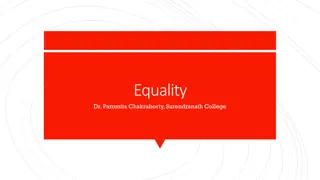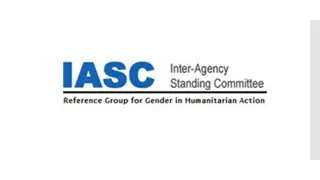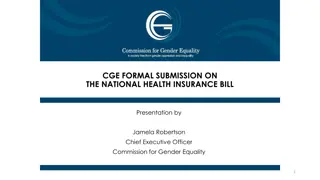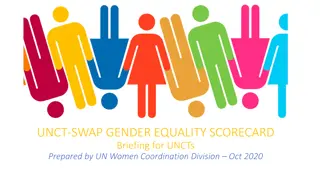Ensuring Gender Equality and Women's Rights in Botswana's Constitutional Review
Explore the journey towards constitutional enshrinement of gender equality and women's rights in Botswana through a gender perspective. Gain insights into the significance of this review in advancing gender equality and empowering women.
Download Presentation

Please find below an Image/Link to download the presentation.
The content on the website is provided AS IS for your information and personal use only. It may not be sold, licensed, or shared on other websites without obtaining consent from the author.If you encounter any issues during the download, it is possible that the publisher has removed the file from their server.
You are allowed to download the files provided on this website for personal or commercial use, subject to the condition that they are used lawfully. All files are the property of their respective owners.
The content on the website is provided AS IS for your information and personal use only. It may not be sold, licensed, or shared on other websites without obtaining consent from the author.
E N D
Presentation Transcript
How to ensure gender equality How to ensure gender equality and women s rights are and women s rights are constitutionally enshrined? constitutionally enshrined? Botswana Constitutional Review: from a gender perspective By Vanilde Furtado, 10th February 2022
How How to to build equality equality and build a a political and women s women s rights political momentum momentum to to ensure rights are enshrined? enshrined? ensure gender are constitutionally constitutionally gender Constitutions and their effective implementation are one of many factors that ultimately lead to substantive gender equality; A well-designed, gender responsive constitution may enable women to assert their rights, enjoy full and equal citizenship, and participate in political decision- making and public life on an equal footing with men; Continued negotiation and advocacy is needed to promote both women s participation in constitutional review process as well as constitutional outcomes that support gender equality and women s rights.
Constitutional Review Processes Constitutional Review Processes A constitutional moment: political decision, trigged by a national need Setting the agenda: parties involved have to negotiate and agree on the guiding principles, structure, membership and procedures of the constitutional review body. Consulting, negotiation, designing and adopting a constitution: while drafting and negotiation of the constitutional content takes place within a constitutional review body, this process is often influenced and supported by actors outside of the formal process, such as civil society, legal experts, international NGOs and UN agencies. Many constitutional processes also include one or more rounds of public consultation. Implementing the constitution: after a constitution is promulgated, the work of realizing hard-won rights and protections begins.
HOW HOW advocates advocates from feminist from feminist movements, gender movements, gender machineries, machineries, constitutional review constitutional review bodies, bodies, parliamentary parliamentary caucuses, law reform caucuses, law reform commissions, the UN commissions, the UN System and others System and others can advance and can advance and advocate for advocate for women s rights ? women s rights ? A shared gender agenda for constitutional review; A strong inclusive and diverse coalition around gender agenda and strong alliance with different stakeholders, including decision makers, at national and local levels and work closely with the constitutional commission Continuous negotiation and advocacy for women s participation and gender outcomes Participation, civic education & social mobilization, coordination, strong alliances, advocacy and lobbying, support
Advancing gender equality begins with womens Advancing gender equality begins with women s PARTICIPATION in constitutional review processes PARTICIPATION in constitutional review processes Women s representation in constitutional review bodies (where are women?) https://www.mmegi.bw/news/masisi-appoints-commission-of-inquiry-on- constitutional-review/news (only 5 out of 19 members are women; both chair person and vice-chair person are males; a secretariat of 5 people, being 4 women) How to maximize the equal participation of women in all stages of constitutional review? Making the case for women s participation (a matter of principle, but also anchored in normative frameworks, such as CEDAW (art 7); Beijing Platform of Action Women are critical constituencies and represent the majority of society Women are not a homogenous constituency. Their experiences are shaped by intersecting identities (e.g., ethnicity, language, religion, disability, sexual orientation ) and this intersectionality also brings value to constitutional review processes (hep to shape protections for other marginalized groups in society) Women civil society leaders frequently organize campaigns to solicit inputs from broader public, including women, and then consolidate and amplify those priorities within the formal process (women effective at broadening participation to build more democratic and inclusive process)
key steps of a strategy to ensure GE and womens key steps of a strategy to ensure GE and women s rights in constitutional provisions rights in constitutional provisions Setting a CSO s advocacy committee for GE in the constitutional review process across diverse constituencies, recognizing and celebrating the intersectionality of women s experiences (gather a group of up to 20 or 30 women leaders and gender activists) to develop strategies for influencing the constitutional drafting process; Draft a background note on key gender equality considerations for the revised constitutions, as a basis for the common women s agenda/ minimum gender agenda Building consensus for the common women s agenda/ Minimum Gender Agenda for Constitutional Review nation- wide consultation exercises to build momentum on GE s priorities (civic education and outreach can be done in collaboration with other actors/ groups such as the UPR NGO s Working Group/ BOCONGO Human Rights and Gender Thematic Working Group - as part of a broader civic education programme) women leaders and GE advocates should agree, to the degree possible, on which substantive issues or provisions to prioritize. Messaging should build in this consensus. Develop a series of formal recommendations to the Presidential Commission of Inquiry into the review of the Constitution of Botswana - based on evidence-based gender equality arguments; while leverage close partnership with MNIGA/ GEAD Identification and mobilization of key allies in different power settings - to build a roster of allies - (media, academia, parliament, political parties, men, women in cabinet, traditional leaders, development partners, including women ambassadors, first lady, ) promote understanding, buy-in and articulation of the demands Lobbying actions/ strategic advocacy (decisions around who/how and when recommendations are delivered should be informed by a power analysis and mapping exercise that clarifies who the advocacy target is, what their interests are, and who they are most likely to listen to).
Technical and Advocacy inputs Technical and Advocacy inputs A CSOs gender equality committee/ task force (at technical level) to draft the position paper; to design and facilitate consultations and consensus building; to finalize the gender agenda; A small core-group for lobbying (to deliver key messages, to hand-over the position/ demand paper; to speak on behalf of the CSOs gender equality committee in formal meetings with the appointed Committee for Constitutional Review and high level policy decision bodies) this should be guided by a power analysis and mapping exercise); Expanded gender platform/ coalition (which includes key allies, at national and district level, to influence, spread the word; identify key opportunities and entry-points; support participation of gender advocates; ensure a positive feedback cycle; aligned of priorities between insiders and outsiders; and make a case for women s rights in different forums); Representatives of gender equality committee seating at different committees (per thematic area) & support women within the Commission of Inquiry into the Constitutional Review;
Operationalizing the process/ kicking Operationalizing the process/ kicking- -off off Share comments/ feedback on the consultation process planning setting the tone - emphasize equality and non-discrimination and women s rights as foundational building blocks for every constitutions; seeking promotion of international norms and standards; refer to the country s national, regional and international commitments on gender (including status and recommendations to Botswana); call for equal participation of women ensure that women s voices are heard; refer to key background documents, policies and papers; suggest a specific consultation with women s groups; express willingness and availability to support the review process/ List potential members of the CSOs Gender Advocacy Committee (who, criteria invitation procedure ) and modus operandum List of allies/ champions to engage with/ strong network including within the Presidential Commission of Inquiry into the review of the Constitution of Botswana Pen-holders for the background note/ minimum gender agenda Batswana Women s Charter?? Many messages, one voice Sierra Leone Prepare a consensus building seminar on: Gender Equality and Women s rights agenda for the Constitution Review Timelines Roles and responsibilities Request technical and financial to support the process A slogan? (Let Us Talk sierra Leone; Together for Yes Zimbabwe; Women for the Constitution - Tanzania );
Request UN Womens Technical and Financial UN Women s Technical and Financial support/ assistance drafting of background note and minimum gender agenda; nation-wide consultation and building consensus; lobbying initiatives and gatherings; in mobilizing and facilitating the engagement of women from across different sectors of society; regional and international exchange experiences and best practices on integrating gender equality principles; production and dissemination of communication and outreach materials
Draft of the background note and Minimum Draft of the background note and Minimum Gender Agenda Gender Agenda the shared agenda is one of the most powerful tools the shared agenda is one of the most powerful tools for achieving influence in a constitutional process for achieving influence in a constitutional process Desk review/ Revisit (among others): CEDAW Committee recommendations to Botswana (2019) UPR Recommendations to Botswana (2018) Women and Law (World Bank report) SIGI Botswana country report (OECD, 2019) CSOs position papers + Women s PP statements Conduct a gender assessment of the current Botswana Constitution (to identify & map gaps and opportunities)/ gender audit of the Botswana Constitution (examining the constitution for gender discriminatory language and provisions, determining whether it complies with international normative frameworks, and proposing reforms based on findings and good practices from other countries). Conduct comparative constitutional review (how to frame particular gender-related provisions and comparative examples of constitutional good practices) special attention to Chapter II Protection of Fundamental Rights and Freedoms of the Individual Broad consultation for inputs and endorsement https://constitutions.unwomen.org/en/dashboard https://www.worldpolicycenter.org/policies/
The Minimum Gender Agenda The Minimum Gender Agenda A core set of demands A core set of demands Must cover a wide range of issues, usually organized around the following broad categories of constitutional provisions: Equality and non-discrimination; Women s rights; Women s rights in marriage and family life; Citizenship and nationality; Property, inheritance and land tenure; Equal participation in all spheres of life, including in political decision- making powers affirmative actions Status of international law; Gender equality machinery Additional areas: education; employment rights and protection; protection from violence; sexual and reproductive rights; sexual orientation and gender identity; and status of religious/customary law
Constitution of Botswana 9 Chapters Chapter II Protection of Fundamental Rights and Freedoms of the Individual Others that my require specific attention: (gender responsive language, parity/ participation and legal system) Chapter IV the Executive Chapter V Parliament (Part III Ntlo ya Dikgosi)
Key possible topics to be reviewed: A robust and comprehensive definition of the principle of non- discrimination (direct and indirect; beyond formal equality and intersecting identities ) Ss 15 (1), (4), (5) protection from discrimination on the ground of Broad language on women s rights, with a focus on specific areas where women face more discrimination and equality needs to be promoted: women s economic empowerment, women s political participation, violence against women; Provisions on the need for temporary special measures/ affirmative action (women s political participation); Citizenship and nationality, marriage, Gender responsive language
Practical tools and guidance for gender responsive Practical tools and guidance for gender responsive constitutional design: constitutional design: UN Women - A guidance note on the making and shaping of Constitutions from a Gender Perspective (2021) UNDP Women s Rights in Constitutions: good practices in advancing gender equality and women s empowerment in constitutions (2017) International IDEA Constitution Assessment for Gender Equality (2016) Euromed Feminist Initiative IFE-EFI - ABC for a gender sensitive constitution: handbook for engendering constitution-making (2015)
